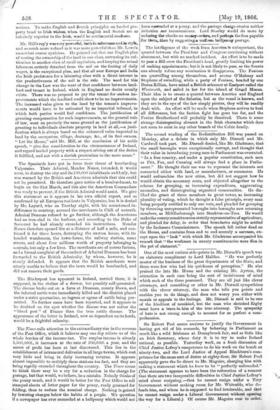Mr. Mill's rep'y weever,' powerful, bethin substasineantLastyle,, and as much
more refined as it was more powerful than Mr. Lowe'st somewhat coarse cynicism. He pointed out that our English plan of vesting the ownership of the land in one class, entrusting its cul- tivation to another clam of small capitalists, and keeping the actual labourers entirely detached from the soil on the footing of daily wages, is the exceptional plan, and that all over Europe and India the Irish preference for a labouring class with a direct interest in the productiveness of the soil is the rule. The seed for this change in the Law was the want of that confidence between land- lord and tenant in Ireland, which in England no doubt usually exists. There was no proposal to pay the tenant for useless im- provements which the landlord could show to be no improvements. The increased value given to the land by the tenant's improve- ments would have to be estimated by an impartial tribunal, in which both parties would feel confidence. The justification of granting compensation for such improvements, as the general rule of law, went on precisely the same ground as the justification of granting to individuals absolute property in land at all,—a justi- fication which is always based on the enhanced value imparted to land by the occupation, tillage, drainage, &c., of its first owners. "Let the House," said Mr. Mill, at the conclusion of his noble speech, "give due consideration to the circumstances of Ireland, and regard landed property with a respect arising out of the ditties it fulfilled, and not with a slavish prostration to the mere name."






























 Previous page
Previous page